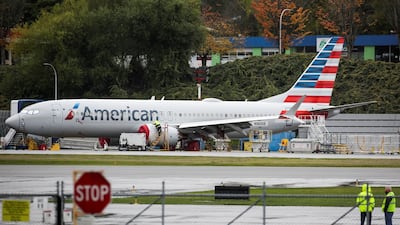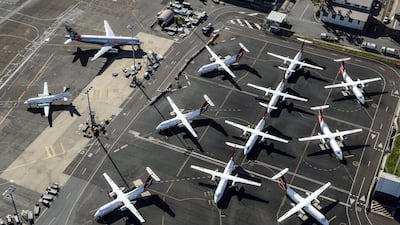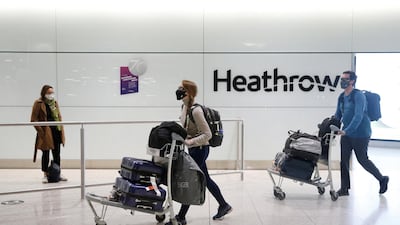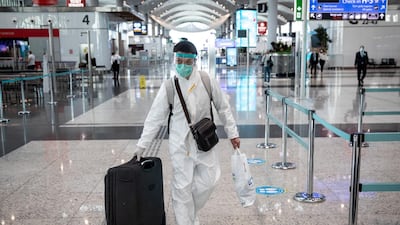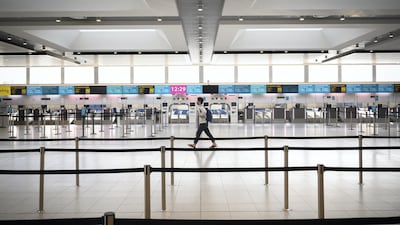The aviation industry has experienced a Covid-induced annus horribilis and further turbulence could now be on the radar.
With most pilots on furlough, struck off or flying reduced hours, rustiness in the cockpit is becoming an increasing problem.
The European Union Aviation Safety Authority conference in November called for vigilance on "all technical and human factors affecting flight safety", in recognition of the many challenges the pandemic has presented.
“Our goal must be to restore the confidence of passengers and to reach a new normal in aviation,” said Johann Friedrich Colsman, Germany’s director general for civil aviation.
However, confidence is unlikely to have been instilled by news from America that Nasa’s aviation safety reporting system has experienced a surge in pilots saying they have made errors due to a lack of time in the air.
Mistakes included struggling to land a plane in heavy wind, forgetting to turn on the de-icing system and failing to disengage the parking brake when pulling away.
Aviation is an industry with a very low tolerance threshold for mistakes — so how has Covid-19 affected the skills of pilots who have largely been lying fallow for the past year? Are they subject to a skill fade that could potentially put passengers at risk?
"Having been an airman I can confirm that if you do spend an extended time out of the cockpit through injury or illness or whatever, it affects many areas of your performance," a senior RAF source told The National.
“For most fast jet pilots, the pure physical strain can be considerable, thus coming back to it after an extended lay-off is hard work.”
Beyond physical issues, pilots also have to contend with mental challenges — and even rhythmic ones.
“We train our people to complete a multitude of tasks by memory and motor rhythms take a long time to train and to ingrain in our crews. Extended time out can reduce your ability to remember and complete these tasks as effectively,” the RAF source said.
Pilots suffering from a loss of rhythm and a diminished ability to perform tasks is likely to give even the most sanguine of travellers pause for thought as they trudge up the aircraft stairs. But is it as bad as it sounds?
No, is the unequivocal answer of Capt Phil Croucher, head of training at Caledonian Advanced Pilot Training.
“Pilots have an extremely deep reserve of knowledge which doesn’t just disappear,” he said. “I can fly twice a year and still take the plane to the ground safely, it’s the little things like asking for clearances and radio frequencies which might slip.
He likened the situation to having learned a language.
“If you don't use it, after six months you can still communicate but you might have lost the finer details.”
Aircraft safety is not compromised by these finer details, he said.
“Minor things like forgetting to operate a parking brake or flicking a switch are consistent with lack of practice. These are procedural errors. What to do in the event of engine or major system failure will not be affected by time spent out of the cockpit,” he said.
This view was corroborated by a source at the Royal Aeronautical Society (RAeS).
“The industry is extremely good at dealing with skill fade,” she said. “Older pilots will tell you that coming back after a long period of not flying isn’t a new phenomenon, and the training is very supportive.”
Capt Croucher went further. “The industry is overchecked. So if there has been any relaxation in the requirements, they won’t involve safety,” he said.
“There are so many back-ups and redundancies in the process to mitigate pilot error too. It’s why you have a captain and a first officer in the cockpit, and pretty much two of everything else in case of failure.”
UK regulator's flexible approach to training in first lockdown
The UK Civil Aviation Authority failed to put up a representative for comment but confirmed to The National that all European training regulations are currently being followed to the letter - although it did allude to exemptions being made last year without giving any more detail.
The RAeS was more forthcoming, however. “[The CAA] allowed a period of grace in the summer. Nothing has ever been waived but we have been granted certain exemptions,” it said.
“During the first lockdown, companies were accorded flexibility because training companies had shut down. Normally rigid timeframes were relaxed and extra simulators provided to help with the training shortfall.
“In the UK we use zero flight time simulators: high-fidelity machines which are such accurate simulations, the only thing that differs from flying an actual aircraft is that you aren’t in the air and you can’t reproduce passenger-related issues.”
The UK’s assiduous approach to training was emphasised by the senior RAF source.

“The civilian airline industry is the same as the military in most respects. If you are not flying for an extended period, you will need to pass a series of tests and checks in the simulator and, if necessary, go flying with a check pilot alongside you in the air,” the source said.
“So despite the prospect of skill fade being an issue, the rules and regulations for all are strict and have been set through hard-won experience.
“We always say in aviation ‘check never assume’, and this is true of everything from engineering to crew currency.”
The real scandal brewing in the aviation industry
Whilst skill fade might not be the problem it seems at face value, the RAeS highlighted an issue that will have longer lasting ramifications.
“We’re more concerned about ‘brain drain’,” a representative said. “We see lots of pilots lacking confidence or even thinking about taking early retirement.”
The effects on industry efforts at diversity and inclusion are also yet to be appreciated.
“Nearly 50 per cent of women in the industry have been lost due to the nature of job cuts,” the RAeS representative said.
A recent International Air Transport Association report said that the industry would not recover fully from the effects of the pandemic until 2024 at the earliest.
A lack of diversity rather than a lack of safety, then, is likely to be the next industry scandal.
“All pilots going back into commercial aviation need to feel confident because training is not costly but accidents are,” the RAeS representative said.
